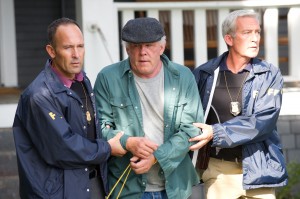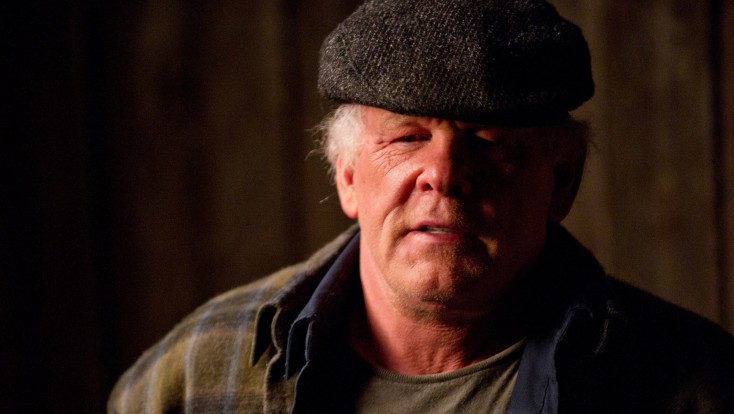
Nick Nolte (center) stars as Donal Fitzgerald in “The Company You Keep.” ©Sony Pictures Classics. Cr: Doane Gregory.
By ANGELA DAWSON
Front Row Features
HOLLYWOOD—To paraphrase Forrest Gump, interviewing Nick Nolte is like a box of chocolates; you never know what you’ll get. Such was the case at a recent press conference with the 72-year-old “Prince of Tides” and “The Thin Red Line” star, where he was expected to talk about his latest work on Robert Redford’s political action thriller “The Company You Keep.” Instead, the maverick actor went off on a jag about LSD trips, dancing and chanting with the Hare Krishna, too small hotel plumbing fixtures and an odd assortment of life experiences, with a sprinkling of sage advice for the younger generation mixed in.
It was truly an unforgettable experience though little was said about the movie, in which he plays Donal, a former member of the Weather Underground, at Vietnam War-era militant antiwar group. Wanted for their involvement in a violent bank robbery some 30 years earlier, Donal and other members of the outlaw group keep a low profile within society. He risks exposure to help an ex-colleague (played by Redford, who also directed the film) trying to avoid capture by law enforcement.
Q: What was it like working with Robert Redford?
Nolte: I was very curious about how Bob worked as a director/actor. I like working with writer/directors, because then you can solve problems right there. I felt no tension from Bob at rehearsals or discussing it at all. When I was called to go to Vancouver (where the film was shot), it went real smoothly. Everything was fine. Then we broke for lunch, and as I was walking away I heard them say, “Roll ‘em!” I looked down and there was Bob running down the alley. (His character) had gotten paranoid hiding at Donal’s place and thought he had called the FBI. Well, I walked onto the set and I said, “Wait a minute. I’m supposed to be driving the car.” Then all of a sudden, Bob disappeared and the producer wasn’t there. It was just three big guys in front of me saying, “Do you have a problem, Mr. Nolte? “ I thought about it for a second and said, “No, I really don’t.” I realized that Bob was going to run that alley and he only wanted to run it once, and he didn’t want (me) to **** up the mark.
Q: Did you guys get along?
Nolte: We tease each other a bit. “How many squats can you do?” Stuff like that. This hotel is awful. I mean the toilets are so **** low. It’s just… why? I know what happened. They took the world average height, including all the races, and it comes out to probably be about five foot. So it doesn’t work for (tall white men). It’s tough, really tough. They should do something about the tubs too. We can’t get in those tubs. They don’t cover you. Do you think the hotel owners really think they will save money on (water) with these tubs by making their clientele uncomfortable? It’s crazy thinking.
Q: What is your take on Weather Underground as depicted in this movie? Are they terrorists or patriots?
Nolte: When I was a kid, my dad went to World War II, and I didn’t know him until he got back. I was born in 1941. We (lived) in Ames (Iowa) in this three-story Victorian house. It looked grand, but a lot of it was rented out. One day there was a lot of excitement because my dad was coming home. I didn’t quite know what that meant. I can’t say I was very lucid at the time, but I remember the feeling of excitement. Then I remember the image (of my dad) in the doorway, which was a skeleton, just a skeleton. He was 6-foot-6 and he must have (weighed) 140 pounds. They took him upstairs and then I had to go up and sit in the rocking chair beside this skeleton that would just be going, (makes a wheezing noise). So it occurred to me, whatever he went through, I didn’t ever want to do. I decided I didn’t want to kill anybody. I just can’t do that. I know I can’t do that. I don’t like the idea of killing. I don’t like the idea of war. Who does? We’ve got a chance to make it as a race, if we don’t we do another world war. I think we have got a good chance. We seem to have learned a huge lesson there. I’m not going to live much longer, so I don’t know what will happen 30 or 40 years from now, but it’s going to be interesting.
Q: Is that something you’ve tried to instill in your children?
Nolte: When my son, Brawley, was 12, I said to him, “Do you want an open house or a closed house?” and he said, “What’s the difference? “I said, “In an open house, we allow people to come in, but we have rules. There’s a bedtime rule during the school week and we allow a certain limited number of friends you can have living with you, and in a closed house, you can have none of that. You go to school. You can have friends over for playtime, but they go home by 6 p.m.” Of course, he chose an open house.
Q: Did your life change after your third Oscar nomination?
Nolte: I just never liked Oscars. They didn’t do much for me at all. I felt like a big, overblown, vulnerable baloney being used to sell some product. They asked me once to be a presenter, and I said, “Yeah, I’d love to if you give me one quarter of one-half percent of the profits.”
Q: What did you like about the script and the character you play?
Nolte: Honestly, the yearning to tell the story. I’ve got the bug. I’ve got the distortion in me. I’ve got a love that Katharine Hepburn would say that there should be a law against you having a relationship, because you love your work, and it’s not going to be fair to anybody. It’s killing me not being able to talk coherently about the generation of the ‘60s. It had such a phenomenal impression on this country to change and to accept (defeat). The women, throwing away that damned girdles. You replaced it with hair from your ankles to the top of your head so it wasn’t about sex at all. It was about a girdle. You wouldn’t accept your parents forcing you to wear something that really wasn’t healthy for you. For men, I don’t know if we could wear blue jeans, but we could wear different colored khakis to school. (In an act of rebellion) I wore one red sock and one blue sock. I got away with it because I didn’t have a lot of money.
Q: What do you think of your young co-star Shia LaBeouf? Do you think he and other actors of his generation have it harder or easier than you did?
Nolte: I don’t think it’s a question of harder or easier. The question is: is this generation using the tools that it has? The answer is a rip-roaring yes. It’s too bad we didn’t have the Internet in the ‘60s. It probably wouldn’t have happened.
Q: A couple of years ago, we had the Occupy Movement, which was this generation’s response to the ills of society. I was wondering if you watched that movement and were you encouraged by it?
Nolte: I don’t know what it is. Unfortunately, I just live in a little isolated world with a garden and vegetables and films, but I do hang out with the Hare Krishnas. The reason I hang out with Hare Krishnas is not because of the religious doctrine, it’s because they chant, and I like to chant … and dance. So I will hold some events at my house, or I will go down to the Venice (California) Temple and do that. I know that I had trouble with church (as a youth) because it went from church, then to Sunday school. I finally put my foot down and said, “No, I am not going.” We went to church, but we didn’t go to Sunday school. Then, the next week, we didn’t go to church or Sunday school. That doesn’t mean that I didn’t get something out of that church. I have prayed and been relieved. If it’s bad enough, I will say a prayer.
Q: Our country seems to have this history of a kind of push back, where this different kind of thinking generates a huge push back from our government. So, do you think in this film is about a specific witch hunt that Robert Redford and Susan Sarandon’s characters are going through or is it simply a moral right or wrong tale?
Nolte: Nobody likes change. There’s only one thing consistently true, that there will be change. That’s just the dilemma of it. There will always be resistance to change, and there always will be change. The quicker you get that, the easier it is. It’s not such a difficult thing. If you entrench yourself and refuse to change, you’re a dead man.
Q: What did you think about the Weather Underground in the ‘60s? Have your feelings about them changed?
Nolte: I didn’t even really know of them. They were such a fringe group. I had heard about them, but violence was something I was trying to avoid. A lot has happened in our time. I always say that every generation will be challenged morally once in their life about its government, and they will have to say where they stand.
Q: Before your success in the ‘70s with “Rich Man, Poor Man” and “The Deep,” what were your dreams as a young actor?
Nolte: What I was aware of was that if you have to act and you need to act, then go act. I did regional theater for 14 years. I had a whole circuit. I would work in Phoenix. We developed quite a few repertory companies out of there. My (first) wife Sheila went through some harrowing situations with me. One of them was when I was a friend of this photography professor. We would go out in the desert and take LSD. I did this for about eight trips. On the eighth trip, we were coming back and I guess he had gotten into a little bit of a struggle because he turned to me and he said, “You wouldn’t make it without me.” In one sense, that’s absolutely true, and in another sense, that’s absolutely ****, because we will all make it. We are all right. A lot of the way we see things were changed from these psychedelic trips. It’s not that that was a new thing. It had been around for thousands of years—mushrooms and things like that. It had always been assimilated into the culture, either religiously, or through storytelling, or in some way. What gets me is the attack of a plant, when it obviously has a symbiotic relationship with human beings. All these plants are part of us. Take broccoli, for example. When humans started eating broccoli in the wild, you couldn’t have eaten it, but somewhere along the line that plant said, “Listen, I’ll make a deal with you. You take care of me, and I will be your food.” There is a relationship going on there.





